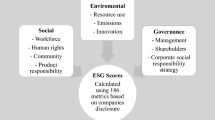Abstract
Firms and divisions which are not traded on organized exchanges are often valued without the benefit of market data. Accounting data is used instead. One suggested approach is to use accounting beta as a proxy for market return beta. In the context of the Arbitrage Pricing Theory, we provide a theoretical justification for such a procedure. Our results provide a set of sufficient conditions so that return betas and accounting betas are equal. Our results also suggest a general methodology for evaluating projects and untraded firms using accounting data. The method underlying the derivation here is very general and can be applied in deriving testable restrictions between fundamentals, broader in context than that of accounting variables.
Similar content being viewed by others
References
Beaver, William H.,Financial Reporting: An Accounting Revolution. Englewood Cliffs, NJ: Prentice-Hall, 1981.
Beaver, William and James Manegold, “The Association Between Market Determined Measures of Systematic Risk: Some Further Evidence.”Journal of Financial and Quantitative Analysis 10(2), 231–284, (June 1975).
Beaver, William, Paul Kettler, and Myron Scholes, “The Association Between Market Determined and Accounting Determined Risk Measures.”The Accounting Review 45, 654–682, (October 1970).
Breeden, Douglas, “An Intertemporal Asset Pricing Model with Stochastic Consumption and Investment Opportunities.”Journal of Financial Economics 7(3), 265–296, (1979).
Brigham, Eugene F. and Louis C. Gapenski,Intermediate Financial Management, 4th Ed. New York: The Dryden Press, 1993.
Connor, Gregory and Robert A. Korajczyk, “The Arbitrage Pricing Theory and Multifactor Models of Asset Returns.” in Robert Jarrow, Vojislav Maksimovic, and William Ziemba, eds.Finance Handbook. Amsterdam: North Holland Publishers, 1994.
Copeland, Tom, Tim Koller, and Jack Murrin,Valuation: Measuring and Managing the Value of Companies. New York: John Wiley & Sons, 1990.
Cox, John, Jonathan Ingersoll, and Steve Ross, “An Intertemporal General Equilibrium Model of Asset Prices.”Econometrica 53, 363–384, (1985).
DeThomas, A.R. “Valuing the Ownership Interest in the Privately-Held Small Firm.”American Journal of Small Business 9(3), 15–27, (Winter 1985).
Dukes, William P., Oswald D. Bowlin, and Christopher K. Ma, “The Valuation of Closely-Held Firms: A Survey of Practitioners and Educators.” Working paper, Texas Tech University, 1991.
Ferson, Wayne E., “Theory and Empirical Tests of Asset Pricing Models.” in Robert Jarrow, Vojislav Maksimovic, and William Ziemba, eds.Finance Handbook. Amsterdam: North Holland Publishers, 1994.
Foster, George,Financial Statement Analysis, Englewood Cliffs, NJ: Prentice Hall, 1986.
Gonedes, Nicholas J., “Evidence on the Information Content of Accounting Numbers: Accounting-Based and Market-Based Estimates of Systematic Risk.”Journal of Financial and Quantitative Analysis 8(3), 407–443 (June 1973).
Kantor, Jeffrey and Richard Pyke, “Valuing Unlisted Shares: A Dual Approach to the Major Information Determinants,”Managerial and Decision Economics 8, 221–227, (1987).
Kaplan, Robert S., “The Information Content of Financial Accounting Numbers: A Survey of Empirical Evidence.” in A.R. Abdel-Khalik and T.F. Keller, eds.,The Impact of Accounting Research on Practice and Disclosure. Durham: Duke University, 1978.
Keenan, Michael, “Models of Equity Valuation: The Great SERM Bubble.”Journal of Finance 25(2), 243–273, (May 1970).
Lintner, John, “Valuation of Risk Assets and the Selection of Risky Investments in Stock Portfolios and Capital Budgets.”Review of Economics and Statistics 47, 13–37, (1965).
Long, John, “Stock Prices, Inflation, and the Term Structure of Interest Rates,”Journal of Financial Economics 1, 131–170, (1974).
McCarthy, G.D. and R.E. Healy,Valuing a Company: Practices and Procedures. New York: John Wiley and Sons, 1971.
McElroy, Marjorie and Edwin Burmeister, “Arbitrage Pricing Theory as a Restricted Nonlinear Multivariate Regression Model.”Journal of Business and Economic Statistics 6, 29–42, (1987).
Mear, R. and M. Firth, “Risk Perceptions of Financial Analysts and the Use of Market and Accounting Data.”Accounting and Business Research 18(72), 335–340, (1988).
Merton, Robert, “An Intertemporal Capital Asset Pricing Model.”Econometrica 41, 867–887, (1973).
Mossin, Jan, “Equilibrium in a Capital Market.”Econometrica 34, 768–783, (1966).
Pettit, Richard and Randolph Westerfield, “A Model of Capital Asset Risk.”Journal of Financial and Quantitative Analysis, 1649–1668, (1972).
Pratt, S.,Valuing Small Businesses and Professional Practices. Homewood, Illinois: Dow Jones-Irwin, 1986.
Sharpe, William, “Capital Asset Prices: A Theory of Market Equilibrium.”Journal of Finance 19, 425–442, (1964).
Reisman, Haim, “A General Approach to the APT.”Econometrica 56, 473–476, (1988).
Ross, Stephen, “The Arbitrage Theory of Capital Asset Pricing.”Journal of Economic Theory 13, 341–360, (1976).
Weston, J. Fred and Eugene F. Brigham,Essentials of Managerial Finance. 10th Ed. New York: The Dryden Press, 1993.
Author information
Authors and Affiliations
Rights and permissions
About this article
Cite this article
John, K., John, T.A. & Reisman, H. Accounting data and asset valuation: Theory. Rev Quant Finan Acc 4, 311–320 (1994). https://doi.org/10.1007/BF01078801
Issue Date:
DOI: https://doi.org/10.1007/BF01078801



